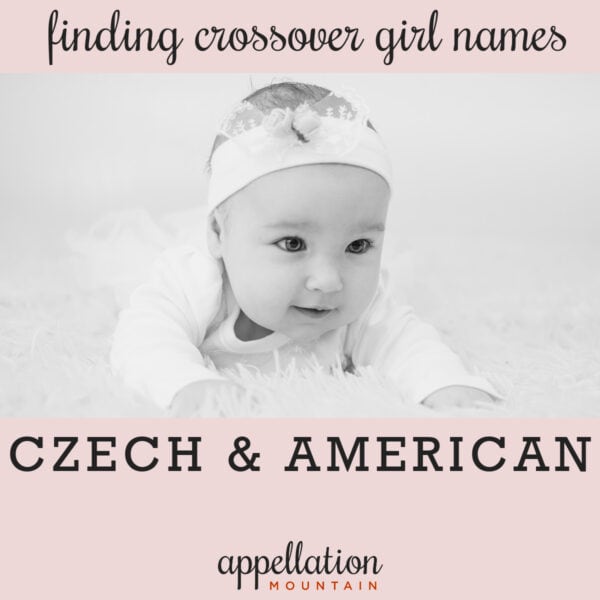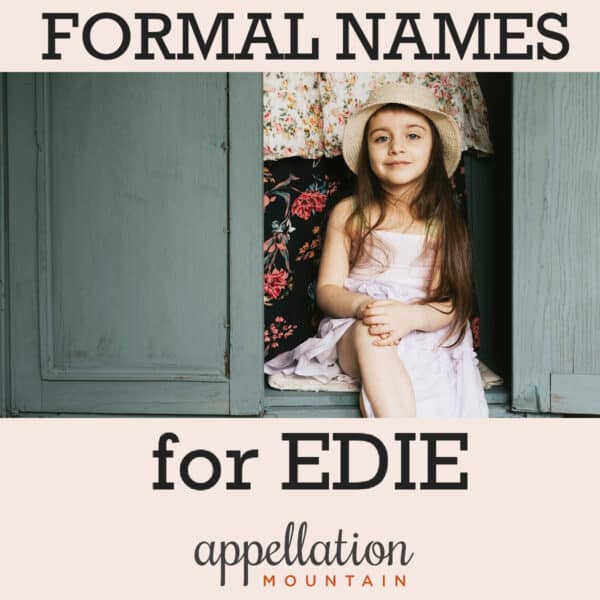She’s a botanical choice with a literary edge.
Thanks to Laura for suggesting Bryony as Name of the Day.
Bryony and equally valid variant Briony have never cracked the Top 1000 in the US. It’s something of a surprise. Besides the current craze for floral names from Lily to Violet, Bryony’s bri- fits in with many of the more popular choices for girls:
- There’s literary Briana at #145 in 2008. She’s topped by alt spelling Brianna at #23. Breanna is also common, at #168. All three probably owe less to Edmund Spenser and more to the many boys christened Brian in the 1970s;
- Brielle ranked #338, while Gabriella, Gabrielle and company are among the most popular choices for girls;
- Other names sharing something of Bryony’s sound include Sabrina, Briley and Aubrey.
Maybe it is because there’s no Bryony in your local flowershop or backyard garden. The flowering vine is native to Europe, though it is now found elsewhere, too. The Royal Navy has named two ships after the plant. The name comes from the Greek bryo – to grow – via the Latin bryonia. (Bryonia is the official name of the plant genus, too.)
Should you meet a Bryony, odds are strong that’s she British. Some sources insist that she’s been in use since the 1700s. I expected to find her amongst lesser-used nineteenth century names. And maybe she was. But you were far more likely to meet a Myrtle, and bryony is rarely mentioned, even in lists of flowers compiled by those botanically-minded Victorians.
Perhaps that’s because bryony is poisonous, and has also been referred to as mandrake or the devil’s turnip. The best-known Briony is probably Ian McEwan’s character from Atonement. It is a fitting choice – her actions poison the lives of many.
Atonment was published in 2001 and adapted for the silver screen in 2006, but set in 1935 England. Without giving away too much of the plot, Briony Tallis is thirteen when she misinterprets something that she sees, and sends the wrong man to prison. A disastrous chain of events follows.
It was a reasonable choice for a twentieth century character. Both spellings of the name have been in sparing use, and you can find athletes, actresses and politicians answering to the name. But the fictional character remains the most noteworthy, joined by figures like the bronze medalist in windsurfing at the Beijing games and a minor EastEnders character.
Overall, she’s an attractive option. Bryony isn’t as out there as Azalaea or Chrysanthemum. Like the Welsh Briallen, she makes for a fresher bri- name than any of the Brianna/Brielle/Briley options.
Bryony is that rare choice that splits the difference between nouveau names like Makaylyn and vintage choices like Hazel. She makes for a great compromise name, and is a subtle way to honor a father or friend named Brian, too.




I was given the name Bryony and I’m a guy 🙂 I know some places say the name is uni-sex but I seem to be only Bryony that’s male that I’ve ever met or seen online. I love my name but hate when people pronounce wrong…. Far too many horrible ways that they have butchered to list here lol. I prefer BRY-uh-nee that’s what every person I’ve met with the name prefers. All the others I’ve met with my name are really nice and creative people which is cool :).
It’s a name that works best for girls in my opinion… when people try to make it sound masculine it’s not very nice at all. Most of the time I go by Bry… most people assume it’s short for Bryan which is fine with me 🙂
I’m a Briony, pronounced like ‘cry’, in the uk, and while it’s not necessarily the first name i would have picked, i despise it when people call me “bree-on-eee”; rhyme within a name sounds so frilly, who would take that name seriously? It’s been a wierdly common name in my life though, i’ve been to school with two different Brionys, both pronounced it the same way but spelled one of each way, and i’ve met a few others, all of whom also pronounce it like me. The only people i’ve heard say bree-o-nee are people who’ve never heard the name before. Of course, the spelling with an “I” instead of two “Y”s makes the pronounciation a little bit less obvious, but it’s a native english plant and the word has been in use since before standardised spelling, in old and middle english, so we’ve been left with multiple spellings for the same word. Of course, since it’s a plant name the easiest way to decide it is just to go by the way you pronounce the plant, which IS standardised, /ˈbraɪ.ə ni/ = brai-uh-nee.
The thing that really bugs me about it is when people try and tell me “that’s a gallic name”, and when i say “old english actually” they try to tell me i’m wrong. It’s close to bronwyn so people assume it’s a derivative and are upset when it’s not.
*gaelic not gallic.
A *very* good point about the plant name, Briony!
I’m an English Bryony and I have always been BRY-o-nee, so have all the other Bryonys I have met (about four or five). I used to hate my name because noone could ever say it properly and it’s been spelt every way under the sun; teachers in particular called me Byrony which drove me mad, surely its not that hard to pronounce from reading it! Anyway I love it now and enjoy having an unusual name. I have also found myself and every other bryony I have met have been creative and a little bit away with the fairies 🙂 coincidence?